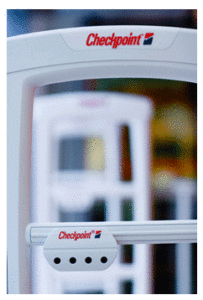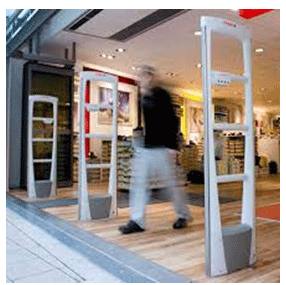 A French Historian is accused of stealing American war heroes’ dog tags to sell on eBay.
A French Historian is accused of stealing American war heroes’ dog tags to sell on eBay. - Store clerk accused of stealing thousands in lottery tickets
The retail industry is not the only one dealing with theft in the United States. The retail industry looses more than $35 million dollars to shoplifting every day in the United States. But, theft does not seem to restrict itself to retailers, theft occurs in every place where the opportunity arises. The shoplifter can be a member of a shoplifting ring, or a regular shopper who has a job, a family, or even financial stability.
There is not a profile of a typical shoplifter. The shoplifter can be a government representative or a store clerk, a policeman or a French Historian, a shoplifter can be a member of your family or a neighbor. Many of these people often times feel ashamed or are unable to talk about this issue with other people and are unable to seek help, but the problem does not go away, and everyone looses.
If you are in the retail industry and believe what a shoplifter looks like as they enter the store, then you have already lost against shoplifting. Training the management and employees of a store to combat shoplifting is an important aspect of any store that wants to be profitable.
Read more about this and other issues by clicking the links below.
Exactly What Is a Shoplifter and How Much Do You Know?
Industry veterans may find it odd to ask ‘What is a shoplifter?’ after years of experience. But it’s always good to revisit the fundamentals.
When asked “What is a shoplifter?”, most readers of the LPM Insider probably have a pretty good idea of how to respond. I do too, but it’s interesting what you learn (or re-learn) when you actually do some research on the subject. If you look up the definition of shoplifting, you will find different variations in wording. Some reference larceny, some concealment, and others talk about intent. But the basic definition boils down to this: shoplifting is the “theft of merchandise from a store or place of business.”
The terms “shoplifting” or “shoplifter” are not usually defined by law. The crime of shoplifting generally falls under the legal classification of larceny and can be a misdemeanor or felony, depending on the dollar amount stolen. State by state, larceny laws vary greatly.
For the average person, shoplifting is sometimes confused with burglary or robbery. However, all three are different. Burglary refers to unlawful entry into a building with the intent to commit a crime, especially theft. If a burglar is successful, they will not come in contact with another person.
Shoplifting girl sparks compassion from Atlanta police officer
Atlanta (CNN)In a rough part of this city’s northwest side, the call about a shoplifter at a discount store should have been straightforward.

 As many of you know Alpha High Theft Solutions was acquired by Checkpoint Systems many years ago. Checkpoint has encouraged Alpha’s brand growth and innovation. Alpha has produced the best high theft solutions, hands down in the industry. Innovations like Spider Wrap, Keepers, Bottle Locks, Cable Locks, Shark Tags, specialized hard tags literally protect billions of retail products worldwide.
As many of you know Alpha High Theft Solutions was acquired by Checkpoint Systems many years ago. Checkpoint has encouraged Alpha’s brand growth and innovation. Alpha has produced the best high theft solutions, hands down in the industry. Innovations like Spider Wrap, Keepers, Bottle Locks, Cable Locks, Shark Tags, specialized hard tags literally protect billions of retail products worldwide. I don’t know how many times I have heard it, but I have heard it said that shoplifting is not a crime that is premeditated. I have heard and read the arguments that dismiss the seriousness of the crime and portray the criminals as opportunists acting on the spur of the moment. Implicit in the argument is the minimizing of the extent of Organized Retail Crime rings as well as the willingness of shoplifters to steal from your customers. I have even had people who think along these lines voice their disapproval when I had shoplifters I had apprehended and was walking to my security office. I recall one occasion when I apprehended three young men, about 14 years of age and was by myself. I had them stand with their faces against the wall as I had to get my keys out to unlock the door to my office. Two men were sitting outside my office and one muttered under his breath that I was being a butt, only he used a more colorful adjective. I looked at him and told him to mind his own business. The point is that there are people more sympathetic to the criminals than retailers and see shoplifting as a minor infraction at worst and mischievous behavior at best. The attitude among those that hold to those beliefs might change if they realized that these shoplifters aren’t necessarily choosy about who they steal from. They also don’t consider the safety risks posed by the careless acts of these criminals.
I don’t know how many times I have heard it, but I have heard it said that shoplifting is not a crime that is premeditated. I have heard and read the arguments that dismiss the seriousness of the crime and portray the criminals as opportunists acting on the spur of the moment. Implicit in the argument is the minimizing of the extent of Organized Retail Crime rings as well as the willingness of shoplifters to steal from your customers. I have even had people who think along these lines voice their disapproval when I had shoplifters I had apprehended and was walking to my security office. I recall one occasion when I apprehended three young men, about 14 years of age and was by myself. I had them stand with their faces against the wall as I had to get my keys out to unlock the door to my office. Two men were sitting outside my office and one muttered under his breath that I was being a butt, only he used a more colorful adjective. I looked at him and told him to mind his own business. The point is that there are people more sympathetic to the criminals than retailers and see shoplifting as a minor infraction at worst and mischievous behavior at best. The attitude among those that hold to those beliefs might change if they realized that these shoplifters aren’t necessarily choosy about who they steal from. They also don’t consider the safety risks posed by the careless acts of these criminals. There seems to be an advice website or YouTube video for nearly everything these days. Want to know who to call for home repairs? Need information about a car before you buy it? Looking for someone to date? Yes, it’s all on the internet, I’ve even completed some plumbing repairs and small vehicle repairs with the aid of online videos. Unfortunately, while there is a lot of help and good information on the world wide web, there are also sites that purport to be “informational” only but the information they provide supposedly tells people how to shoplift. What I find even more irritating is that some of these theft websites allegedly are written by former Loss Prevention personnel. The information they give is sometimes too accurate and could cause problems for a retailer who isn’t informed themselves on how to prevent thieves from stealing from them.
There seems to be an advice website or YouTube video for nearly everything these days. Want to know who to call for home repairs? Need information about a car before you buy it? Looking for someone to date? Yes, it’s all on the internet, I’ve even completed some plumbing repairs and small vehicle repairs with the aid of online videos. Unfortunately, while there is a lot of help and good information on the world wide web, there are also sites that purport to be “informational” only but the information they provide supposedly tells people how to shoplift. What I find even more irritating is that some of these theft websites allegedly are written by former Loss Prevention personnel. The information they give is sometimes too accurate and could cause problems for a retailer who isn’t informed themselves on how to prevent thieves from stealing from them. Shortage control and theft prevention for small retailers which have no Loss Prevention Associates in the store was the topic of a recent article in an online loss prevention magazine. The points were well made and much of it was directed at stores that may have district or regional Loss Prevention Managers. But the truth is there are many small, independent retailers with no affiliation to a larger company. How do these stores cope with reducing shrink and preventing theft? It could be a tough problem but Loss Prevention Systems Inc. (LPSI)has the solutions that can keep small stores keep shortage down and profits up.
Shortage control and theft prevention for small retailers which have no Loss Prevention Associates in the store was the topic of a recent article in an online loss prevention magazine. The points were well made and much of it was directed at stores that may have district or regional Loss Prevention Managers. But the truth is there are many small, independent retailers with no affiliation to a larger company. How do these stores cope with reducing shrink and preventing theft? It could be a tough problem but Loss Prevention Systems Inc. (LPSI)has the solutions that can keep small stores keep shortage down and profits up. In some regions, police departments warn retail stores and home owners of an increase in shoplifting and burglaries during the summer months.
In some regions, police departments warn retail stores and home owners of an increase in shoplifting and burglaries during the summer months. Shoplifting is a crime.
Shoplifting is a crime.
